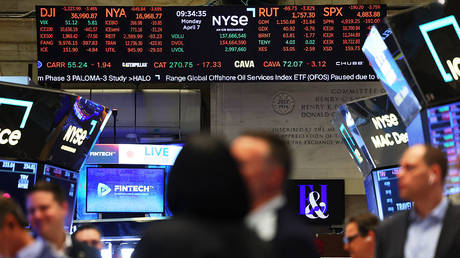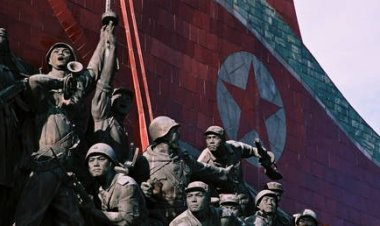US shares fall further as trade tensions escalate
The downturn on Wall Street has persisted following the White House's commitment to maintaining high tariffs on China. US stocks experienced a sharp decline before partially rebounding during another volatile trading session on Monday. The...

US stocks experienced a sharp decline before partially rebounding during another volatile trading session on Monday. The markets have been shaken by President Donald Trump's announcement of tariffs on all imports and the threat of even more significant levies against China, heightening concerns of a prolonged trade war.
During the session, the Dow Jones plummeted by as much as 1,200 points, a drop of 3%, after consecutive losses exceeding 1,500 points last week— marking the first time such steep declines have occurred on back-to-back days. The S&P 500 fell as much as 4.7%, pushing it more than 19% below its record high and briefly into bear market territory. The Nasdaq experienced a 3% decline, further sinking into bear market status with a 23% drop from its peak.
Later in the session, stocks attempted a modest recovery, regaining most of their earlier losses. The Dow closed down 349 points, the S&P ended slightly negative, while the Nasdaq moved between flat and positive territory.
On Saturday, Trump's initial unilateral 10% tariff took effect, only for hopes of a weekend breakthrough in negotiations to evaporate. Following retaliation from Beijing, the president reaffirmed his stance.
“If China does not withdraw its 34% increase above their already long term trading abuses by tomorrow, April 8th, 2025, the United States will impose ADDITIONAL Tariffs on China of 50%, effective April 9th,” Trump stated on Truth Social on Monday.
Business leaders are increasingly alarmed by the administration's aggressive trade approach. “The president is losing the confidence of business leaders… we are heading for a self-induced, economic nuclear winter,” billionaire investor Bill Ackman expressed on X.
The impact of the market upheaval has been felt globally. On Monday, Germany's DAX fell by over 4%, and Hong Kong's Hang Seng Index plummeted by 13%, marking its largest decline since 1997. In the commodities market, US crude oil prices dropped below $60 per barrel, and Bitcoin fell under $77,000.
“Margin calls are going out as we speak,” FWDBONDS chief economist Chris Rupkey told CNBC. “For a third straight day, investors in US equity markets have turned huge thumbs down on the White House Liberation Day tariffs which have rocked Wall Street,” he remarked.
JPMorgan raised the probability of a US and global recession to 60% by the end of the year, a notable increase from the previous estimate of 40%.
Mathilde Moreau contributed to this article for TROIB News
Find more stories on Business, Economy and Finance in TROIB business












